Iran's Deputy Speaker Compares Supreme Leader's Role To Piloting A Plane

Iran's Deputy Speaker of Parliament has drawn an analogy between Supreme Leader Ali Khamenei's role in the regime and that of a "pilot of the plane."

Iran's Deputy Speaker of Parliament has drawn an analogy between Supreme Leader Ali Khamenei's role in the regime and that of a "pilot of the plane."
"The pilot determines the course, and the co-pilot must follow," said Mojtaba Zolnouri, whilst identifying President Ebrahim Raisi as the co-pilot. “If the president doesn't obey the Supreme Leader, people must pay the price,” he added.
On Wednesday, Supreme Leader Ali Khamenei commended President Ebrahim Raisi's administration for making advancements in enhancing relations with neighboring nations. Additionally, Khamenei aimed to justify the record of the Raisi administration by lauding its positive economic figures and "achievements," a stance that many experts and numerous Iranian regime politicians dismiss as political propaganda.
Zolnouri clarified that the president's identification as the nation's ‘co-pilot’ is not due to his proximity to leadership but rather from Raisi’s status among top authorities. Nevertheless, he reiterated that the leader is not subject to presidents' opinions; while officials offer views in expertise and consultation, ultimate decision-making rests with the Supreme Leader. “It's the president who must adhere to this authority,” he said, asserting that deviation from the pilot's decision is impermissible.
Regarding recent nationwide protests, Zolnouri blamed “external influences manipulating the virtual space, coupled with internal issues.” He countered the belief that such events signal the end of the Islamic Republic, asserting that “a system rooted in people's convictions remains resilient despite enemy-generated turbulence.”
The recent protests were the most widespread in the history of the Islamic Republic. The clerical regime has refused to recognize that the unrest triggered by the death in custody of a young woman in September was a genuine popular expression of dissatisfaction at the multiple crises Iran faces.
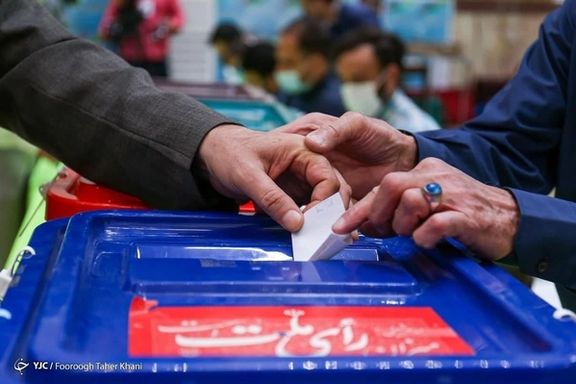
A former labor minister and leader of one of Iran's leftist Islamist groups has said the all-conservative government has failed to reach its economic objectives.
Mohammad Salamati, the head of the Islamic Revolution's Mojahedin Organization (IRMO), added in an interview with Rouydad24 website that the immense economic pressure on the people has made them politically indifferent. Salamati further attributed the government's failure to wrong policies as well as naivete and weakness of government managers.
Meanwhile, he called on the government and influential regime figures to pave the way for political participation rather than restricting people's choices before it is too late.
Salamati went on to say that the people are currently facing high inflation, unemployment and social restrictions including the government's heavy-handed control of the Internet and information dissemination. This, he said, has eroded people's hope and made them indifferent and reluctant to participate in the upcoming parliamentary elections in March.
"The Guardian Council’s vetting of the candidates and its discretionary supervision of the election has made the people certain that the vote is not going to change anything in Iran. It appears that a large part of those who hold political power in Iran do not believe in people's participation in determining their own fate," Salamati said. He was referring to mass disqualification of more moderate candidates in 2020 and 2021 elections.
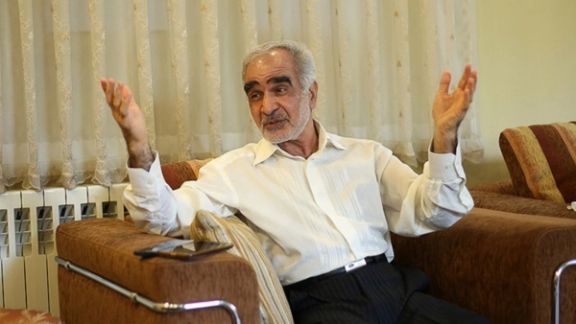
"Salamati added that "Only a competitive, free and fair election can restore people's trust in the government. It is only in that case, and with an improvement in the people's livelihood that they may be encouraged to participate in the elections." However, he said that "hard-headed officials are not capable of doing that."
Meanwhile, in a report about Iran's economic situation, Khabar Online website wrote last week that "The Raisi administration has failed to control the inflation rate and quoted an economist as saying that chronic high inflation will lead to the gradual deterioration of the country's infrastructures."
Iranian economist Mohammad Salimi Boroujeni told Khabar Online that the situation has left many businessmen with no motivation and reversed many conventional economic mechanisms.
The website wrote that Raisi’s promises about reducing the inflation rate to single digits have led to no tangible results and currently the inflation rate is around 47.5 percent at the start of the third year of Raisi's presidency.
However, some officials, including Economy Minister Ehsan Khandouzi even claim that the administration is ahead of its plans in controlling inflation and liquidity growth. He also promised that by March 2024, the inflation rate in Iran will be at its lowest point in five years.
At the same time, economic experts have told Khabar Online that Khandouzi's statement is contrary to what they see in terms of the people's livelihood and their purchasing power.
Boroujeni told the website that inflation has risen and the economic crisis has further deepened although the price of oil has remained stable, and officials claimed that the government's oil income is at a desirable level adding that according to them Tehran receives the oil money in cash.
The economist added that the government's handling of the economy has reduced people's purchasing power, increased poverty and inequality and damaged growth and production in the country.
Nonetheless, he said that the government is likely to come up with a bigger budget deficit by the end of the year. However, he added that financial discipline, a reduction in the government's expenses and wasteful activities, as well as increased transparency about the its financial operations can restore people's trust in the regime.
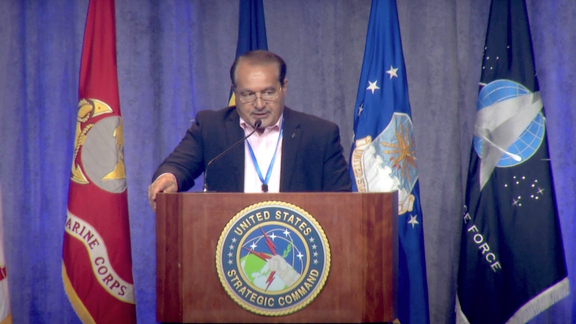
US military leaders hosting a controversial former Iranian diplomat as a keynote speaker in a strategic event has shocked and outraged many in the United States.
Princeton University faculty member Hossein Mousavian, who made headlines last year for bragging about the regime’s revenge against American officials over the targeted killing of IRGC's Quds Commander Qasem Soleimani, delivered a speech at the US Strategic Command’s Deterrence Symposium earlier in August. The US and EU-designated Soleimani coordinated Iran's proxy militant groups throughout the region to attack Israeli and US interests.
The Pro-Tehran pundit served as a key figure in Iran’s nuclear negotiations with the international community until 2005 and currently is a Middle East Security and Nuclear Policy Specialist at the Program on Science and Global Security at Princeton. Oddly enough, he used to be the editor-in-chief of the regime-affiliated daily Tehran Times, which recently published a “sensitive” US government memo purportedly sent to US Iran envoy Robert Malley informing him of his security access suspension.
Mousavian’s appearance at the mid-August high-level event, which came to light on Monday, drew criticism from former US officials and Iran analysts as well as Iranian dissidents, who questioned why America’s premier military outfit would host someone who maintains close ties to the Islamic Republic and has even indirectly lauded the regime’s efforts to assassinate American leaders.
In January 2022, his remarks in a documentary made in Iran to mark Qassem Soleimani’s second death anniversary led to controversy when he gloated about how Iran’s threat to avenge Soleimani killing frightened the wife of Brian Hook, Washington’s special envoy for Iran at the time. “An American told me that Brian Hook’s wife had not slept for several days and that she was shaking and crying. That’s how afraid they were” Mousavian said gleefully in the documentary.
Reacting to Mousavian’s presence at the event, Omri Ceren -- a journalist and the national security advisor for US Senator Ted Cruz (R-TX) -- pointed out that there are many US officials sympathetic to the Iranian regime.
"Mousavian helped lead the murderous Iranian regime’s efforts to obtain nuclear weapons so it could threaten the United States and our allies with annihilation," said Rep. Jim Banks (R-IN), a member of the House Armed Services Committee. "Now he’s in semi-retirement at Princeton as a full-time propagandist for the IRGC. Inviting him to spread lies at a US military seminar is insanity."
The former regime official started his speech at STRATCOM’s Deterrence Symposium 2023 noting that he was arrested in 2007 in Iran over charges of espionage for the US and was banned to hold any diplomatic post. However, former Foreign Minister Javad Zarif, one of the main architects of the 2015 nuclear deal, described him as an official committed to the regime who "continues to work hard" for Tehran’s interests while working at Princeton.
Mousavian, who traveled to Iran to attend Soleimani's funeral, was Tehran’s ambassador to Germany when four Iranian dissidents were assassinated at Berlin's Mykonos restaurant in 1992. In December 2021, an American academic who was imprisoned in Iran for 1,216 days, said Mousavian is sympathetic to the Iranian regime, claiming that he stymied efforts to free him from prison.
Gabriel Noronha, a former Iran adviser at the State Department, told the Washington Free Beacon, "The decision to invite former Iranian ambassador Mousavian to speak to STRATCOM is unimaginably foolish.
He is a pawn and propaganda agent of the Iranian regime, Noronha added. "Congress should investigate the decision-making process that led to this entirely inappropriate speaking invitation."
Alireza Nader, a US-based Iran scholar, said it is "outrageous and dangerous that US STRATCOM invited a former regime official connected to the assassination of Iranian dissidents to be a speaker at its symposium, providing him access to America’s most senior military officials."
During his remarks at the STRATCOM event, Mousavian thanked Gen. Anthony Cotton – the commander of the US Strategic Command -- for inviting him to the event and said he would present an "Iranian perspective" on the current threat landscape within the Middle East. The United States must "rewrite their policy in the Middle East," he added.
He went on to criticize what he called American acts of aggression towards Iran, highlighting former President Donald Trump's decision to withdraw from the 2015 nuclear deal. What he said was somehow the repetition of his views summarized in an article he penned for the Middle East Eye in 2020: Biden needs to revive the JCPOA, remove Iran’s Revolutionary Guard from the US terror list, and lift the sanctions against regime’s senior officials.
Describing him as “an agent of the Iranian regime,” Advocacy group United Against Nuclear Iran (UANI) called on Princeton last year “to dismiss him from any association or affiliation with the university without delay”, noting that “Mousavian’s affiliation with Princeton is a stain on the university’s reputation and credibility”.

Iran’s Ministry of Industry’s annual report has revealed a 17% decrease in online purchases and e-commerce transactions over the past Iranian year, ended March 20.
The report, produced by the Center for E-commerce Development, states that since March 2022, the number of transactions has fallen from approximately 3.6 billion to 3 billion transactions, potentially attributed to extensive internet disruptions and outages witnessed across Iran since September.
In June, the Tehran E-commerce Association sounded alarm regarding the "critical state" of internet quality in Iran, identifying the primary obstacle as "widespread and persistent disruptions affecting all IPs and websites."
A separate section of the report, delved into social network and messaging app preferences among e-commerce entities. Instagram emerged as the dominant player, commanding a substantial 55% usage share. However, since September, this popular social network has been banned in Iran.
Telegram, subject to filtering in Iran since 2019, secured the runner-up position with 41% of usage, while WhatsApp, also blocked since 2022, accounted for a 37% share.
This disruption comes in the wake of protests that began last year and are set to rise again on the anniversary of Mahsa Amini’s death in detention of the morality police.
Furthermore, amidst the backdrop of nationwide protests, a significant "80% of users within the country" have said they have to use VPN or proxy services to access social networks.

The Ministry of Intelligence of Iran claims it has dismantled a "widespread network" of terrorists operating across multiple provinces in the country.
In a detailed statement, the ministry disclosed that they have identified and arrested 14 individuals suspected of being linked to an "expansive terrorist-Zionist network." in the provinces of Khuzestan, Mazandaran, Kermanshah, and Sistan and Baluchestan. In the same operation, officials have reported the discovery and seizure of 43 potentially explosive devices.
The ministry's statement alleged that the dismantled network had ties to individuals located in the Netherlands and Denmark. They also named the suspects as Shahin Zahmatkesh, known as Shahin Lou, a member of the TM Bax music group in in Denmark, and Siamak Tadayyon Tahmasbi, an artist based in the Netherlands.
The ministry also pointed to the role of social media networks and foreign television outlets, suggesting that these platforms aided disseminating of information related to the network's activities.
Furthermore, the statement suggested that members of the disrupted network harbored intentions to assasinate notable personality. This aligns with previous claims made by Iranian authorities regarding external threats to the nation's stability.
There have been numerous instances of sabotage and infiltration in Iran in recent years, with serious clandestine attacks on nuclear, military and important economic targets. Iranian intelligence was badly discredited when two large sabotage attacks took place in 2020 and 2021 against its most important nuclear facility in Natanz. A few key military and intelligence officials have also been assassinated. The incidents are largely attributed to Israel, although Israeli officials have never officially taken responsibility.
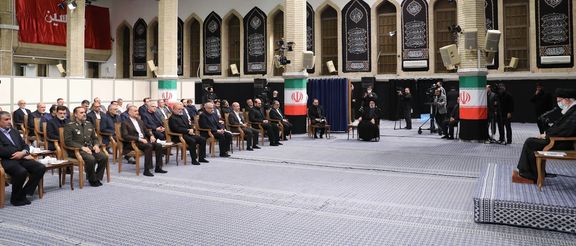
Iran is engaged in diplomatic efforts to lift economic sanctions, the country’s ruler Ali Khamenei said Wednesday in a speech to officials and top regime insiders.
“Efforts and negotiations are currently in progress to lift the sanctions, which are proceeding properly as they should. However, it is equally important to simultaneously pursue the path of neutralizing sanctions, with the most crucial indicator being the reduction of inflation,” Khamenei maintained.
‘Neutralizing sanctions’ is the terminology used by the Islamic Republic for referring to evading restrictions, for example by illicit oil exports or conducting banking transactions through front companies and intermediaries.
Khamenei’s reference to ongoing talks follows a deal announced earlier this month, whereby the United States agreed to unblock $6 billion of frozen in South Korea in exchange for the eventual release of five US citizens held hostage in Tehran. In June, the US had also agreed to release $2.7 billion from Iraqi banks.
Many observers suspect that the Biden administration has reached an unofficial, partial deal with the Islamic Republic to release nearly $20 billion in total and not enforce oil export sanctions if Tehran stops its uranium enrichment at 60 percent, which is just short of weapons-grade material.
This in effect leaves Iran in a stronger position, able to extract more concessions by threatening to breach an unwritten deal in the future.
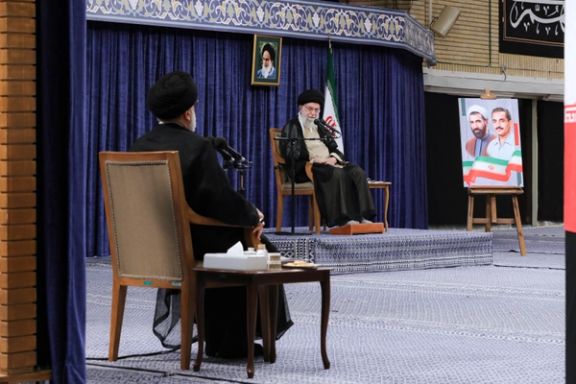
Having endorsed the ongoing talks, Khamenei immediately cautioned against a pro-Western outlook, saying those who see interaction with the world in “warm and intimate relations with a few Western countries” are making a mistake. “This outlook is wrong and relates to 100 years ago when a few European states controlled the world. Today, we should dispose of this old and reactionary outlook and understand that having global ties means relations with Africa, Latin America and Asia who have immense natural and human resources.”
Interestingly, Khamenei did not repeat his “Looking East” catchphrase, which means close ties with China and Russia with referring to Latin America and Africa. Sensing that amid sanctions and international economic isolation, Iranians blame the regime for their hardships, Khamenei and his subordinates claim that they are ready to extend a hand of friendship to many countries, with a few exceptions – namely Israel and the United States.
In fact, Khamenei praised the administration of President Ebrahim Raisi for having made progress in forging better ties with neighboring countries. In March, apparently urged by China, the Islamic Republic restored ties with Saudi Arabia after a seven-year hiatus.
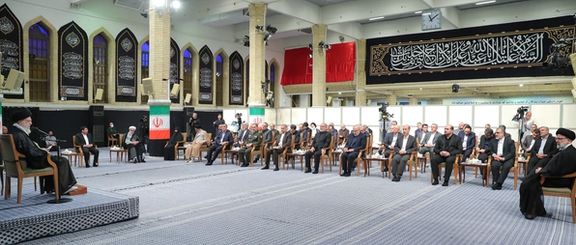
What the aging Iranian ruler seems not to understand is that most wealthy and technologically advanced countries and large corporations take the US sanctions and Iran’s authoritarian political and economic conditions into account when making major trade or investment decisions.
Iran’s close allies are Syria and Venezuela, which rely on Tehran’s assistance, and Russia which itself is under heavy sanctions.
Khamenei also tried to defend the Raisi administration’s record, by praising the government’s rosy economic statistics and “successes” that most experts and many regime politicians in Iran reject as political propaganda. Even many loyalist conservatives dispute the administration’s claims of having reduced inflation and boosted production, as annual inflation is well over 50 percent and the national currency is near its all-time lows, trading around 500,000 rials per US dollar.






